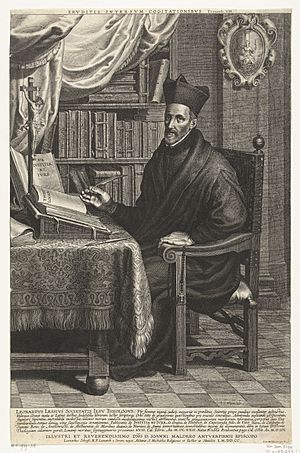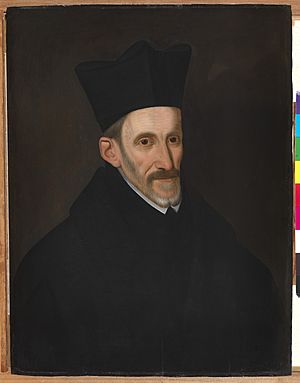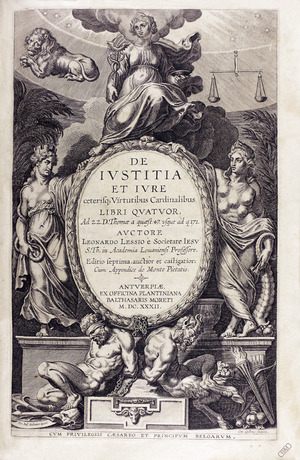Leonardus Lessius facts for kids
Leonardus Lessius (born Lenaert Leys) was an important thinker from Flanders (which is now part of Belgium). He was born on October 1, 1554, in Brecht and passed away on January 15, 1623, in Leuven. He was a Jesuit priest and a moral theologian. This means he studied how people should act fairly and morally, especially in business and law.
Life and Education
When Leonardus Lessius was just thirteen years old, he won a special scholarship. This allowed him to study at the University of Leuven. This university became a very important place for him for the next fifty years.
In 1567, he joined an arts program there. He did so well that he earned the top honor, called "primus," during his final exam.
Lessius joined the Jesuit order in 1572. After that, he continued his studies in theology in Rome. He learned from famous teachers like Francisco Suarez and Robert Bellarmine. Later, he became a professor of theology back at the University of Leuven.
During his early teaching years, Lessius was part of a big discussion. This debate was about predestination, which is the idea that some events are decided beforehand. Lessius believed in free will, meaning people have the power to make their own choices. He faced some challenges for his views. However, in 1615, Pope Paul V personally thanked him for his important work for the Catholic Church.
His Important Work
Lessius is most famous for his book called De iustitia et iure. This Latin title means On Justice and Law. He wrote it in 1605. This book was very popular and was printed more than 20 times in the 1600s.
His book was one of the first to deeply explore moral questions about money and finance. To write it, Lessius visited Antwerp. At that time, Antwerp was a busy world center for business. He studied how banking and commerce worked there.
His real-world experience helped him give good advice on moral problems in business. Modern historians who study economics praise him. They say he had a very clear understanding of business matters, especially about interest (money charged for borrowing). For example, Lessius clearly explained that the price of insurance depends on how risky the event is. He also gave new ideas for a "just price." He understood that old rules from Thomas Aquinas didn't work anymore in the 1500s.
Lessius also wrote another important book. It was called On the Providence of the Deity, and the Immortality of the Soul, Against Atheists and Politicians. In this book, he used "design arguments" to show that God exists. An English version of this book was published in 1631.
After 1610, Lessius's health wasn't very good. He started writing books about spiritual life and theology. These books were also very successful.
His Tomb
Leonardus Lessius is buried in St. Michael Church. This church is a historic Jesuit church located in Leuven. His simple tomb is in the baptistry, which is a special room for baptisms. It is just north of the apse (the curved part of the church). Before this, he was buried at the nearby Jesuit college.
Main Books by Lessius
- De Iustitia et Iure, Lovania, 1605. This book is about justice and law. Parts of it about sales, legal agreements, and insurance were translated into English in 2016.
- De Bono Statu eorum qui vovent..., Colonia, 1615.
- De perfectionibus moribusque divinis, Amberes, 1620.
See also
 In Spanish: Leonardus Lessius para niños
In Spanish: Leonardus Lessius para niños
- Congregatio de Auxiliis
 | Isaac Myers |
 | D. Hamilton Jackson |
 | A. Philip Randolph |




